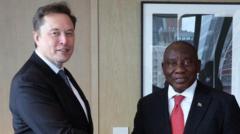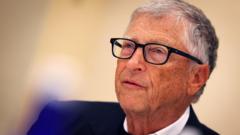In the midst of escalating concerns over land reform in South Africa, President Cyril Ramaphosa has sought to calm a dispute with the United States following President Trump's criticism of a recently passed land law. This involved a direct conversation with tech mogul Elon Musk, who has been vocal about his concerns regarding perceived injustices in South Africa's ownership laws.
South African President Aims to Alleviate Tensions Over New Land Law Through Musk Call

South African President Aims to Alleviate Tensions Over New Land Law Through Musk Call
President Cyril Ramaphosa of South Africa reaches out to Elon Musk in an effort to address tensions with the US government regarding a new land law that has drawn controversy.
Ramaphosa's office released a statement detailing the call with Musk, emphasizing the constitutional values of justice and fairness in South Africa. The new law allows for land expropriation without compensation in specified circumstances, a move aimed at addressing historical injustices stemming from apartheid-era policies. This contentious law permits the government to seize underutilized properties while sparking fears similar to the economic fallout seen in Zimbabwe.
The ongoing debate over land ownership, historically skewed in favor of the white minority, has remained a pivotal topic in South African politics. The law was recently enacted to hasten land reform processes, which have been stalled for decades. Critics, however, warn of potential economic repercussions and unrest as the government grapples with long-standing inequalities marked by race and class.
With pressure mounting from both domestic and international fronts, President Ramaphosa quickly responded to Trump’s threat of funding cuts by asserting that his administration had not engaged in land confiscations. Instead, he reaffirmed South Africa’s commitment to resolving land ownership issues within a framework of equity and justice while reminding the public of its historical context tied to the apartheid legacy.
As the situation evolves, analysts emphasize the importance of closely monitoring how the implementation of this new land law unfolds and its implications for the nation's future.
### Summary:
President Cyril Ramaphosa of South Africa aims to address tensions with the US regarding a controversial land law by engaging in dialogue with Elon Musk. The new legislation allows for land expropriation without compensation under certain conditions, a move aimed at combating historic injustices linked to apartheid. While Ramaphosa emphasizes constitutional fairness, critics remain wary of potential economic fallout similar to that seen in Zimbabwe.
The ongoing debate over land ownership, historically skewed in favor of the white minority, has remained a pivotal topic in South African politics. The law was recently enacted to hasten land reform processes, which have been stalled for decades. Critics, however, warn of potential economic repercussions and unrest as the government grapples with long-standing inequalities marked by race and class.
With pressure mounting from both domestic and international fronts, President Ramaphosa quickly responded to Trump’s threat of funding cuts by asserting that his administration had not engaged in land confiscations. Instead, he reaffirmed South Africa’s commitment to resolving land ownership issues within a framework of equity and justice while reminding the public of its historical context tied to the apartheid legacy.
As the situation evolves, analysts emphasize the importance of closely monitoring how the implementation of this new land law unfolds and its implications for the nation's future.
### Summary:
President Cyril Ramaphosa of South Africa aims to address tensions with the US regarding a controversial land law by engaging in dialogue with Elon Musk. The new legislation allows for land expropriation without compensation under certain conditions, a move aimed at combating historic injustices linked to apartheid. While Ramaphosa emphasizes constitutional fairness, critics remain wary of potential economic fallout similar to that seen in Zimbabwe.


















